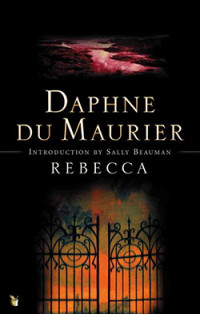Undercurrents
 Rebecca
Rebecca
by Daphne du Maurier
This was, appropriately, the final book in the Discovering Daphne readalong run by Savidge Reads and Novel Insights. I have been looking forward for months to re-reading it, and was a little sad at how quickly I flew through its pages when this week finally came.
One of the reasons I highly rate this book (and no doubt many others would agree) is the great pleasure of re-reading it. This was my third reading (I think) and I loved looking out for the hints of what is to come, as well as spotting the red herrings that had misled me previous times. Knowing the story allowed me to linger over the detailed gothic descriptions when I was in the mood and skim over them when I wasn’t. Despite knowing the outcome, I was still excited by the build-up of tension and on tenterhooks in all the right places. I’m convinced – du Maurier was officially a wonderful writer.
Briefly, this is the story of the second Mrs Maxim de Winter. Or rather, she is the one who tells the story, but for a lot of the time it isn’t about her at all, it’s about Rebecca. Rebecca was Maxim’s first wife and died tragically young, just a year before he met and swiftly married his second wife.
Our narrator, who is never named, feels very keenly that her social status is lower than her husband’s. When they meet in Monte Carlo she is working as a companion to a frightful old woman, and when Maxim takes her home to his beloved Manderley she is overwhelmed by this grand, old, elegant estate. She doesn’t know how to speak to servants, what to do with herself in the huge, almost empty house, how to be entertaining during all the polite social calls that must be made, but above all she is overwhelmed by the looming presence of Rebecca.
This is often described as a ghost story and that’s an accurate description, yet there is nothing supernatural going on. There’s a dead woman, reputed to have been beautiful and charming and capable, and a house full of Rebecca’s things, Rebecca’s impeccable taste, even Rebecca’s preferred schedule. And of course there’s Mrs Danvers, the housekeeper who was devoted to Rebecca and takes an immediate dislike to her successor. It’s a horrible situation for a shy, awkward, young, unworldly woman but it’s made far far worse by her vivid imagination.
The fact that the narrator is unnamed greatly adds to the effect of her not being a character in her own right, but rather a bland, shapeless entity trying to fit into the space left behind by Rebecca. She has no confidence in herself and, as the narrator, brushes aside any compliments so that what little we do learn about her is for the most part unflattering. And yet you can see through her narration to what is going on and I wanted to shake her by the shoulders and tell her to become her own person.
One of the clever things about this story is that a lot is given away in the first chapter, set later in the narrator’s life when a dream has made her think back to the events of the novel, yet as the story reaches its climax you can so easily forget those opening words and be ready for anything to happen. Another thing I like is how much we don’t ever know – not just the narrator’s name but almost anything else about her. Just as all we learn about her name is Maxim’s reaction: “You have a very lovely and unusual name”, all we learn about her family is that they are dead and that she loved her father very much: “It was not easy to explain my father and usually I never talked about him. He was my secret property.”
Along with the secrets and the hold of the past, this book also has a lot of subtexts – particularly the narrator’s fragile mental state. Other characters seem to treat her with kid gloves and, what with everything else that goes unsaid in the novel, it’s hard not to imagine they have reason to do so.
As Savidge Reads planned all along, this gothic tale fitted perfectly with the last week of cold, dark, wet October evenings.
First published 1938 by Victor Gollancz.
Your third reading! I was surprised at how much I enjoyed re-reading this as I normally don’t feel I have time to revisit books, but you’re right it is fascinating to read this book with the knowledge of what is to come but also easy to be spellbound and forget / get lost and feel that anything could happen. Lovely review!
Novel Insights Thank you! It was a reminder of how good it can be to revisit a book and how you can notice different things in it. I should do it more.